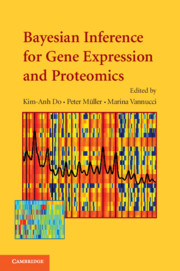Book contents
- Frontmatter
- Contents
- List of Contributors
- Preface
- 1 An Introduction to High-Throughput Bioinformatics Data
- 2 Hierarchical Mixture Models for Expression Profiles
- 3 Bayesian Hierarchical Models for Inference in Microarray Data
- 4 Bayesian Process-Based Modeling of Two-Channel Microarray Experiments: Estimating Absolute mRNA Concentrations
- 5 Identification of Biomarkers in Classification and Clustering of High-Throughput Data
- 6 Modeling Nonlinear Gene Interactions Using Bayesian MARS
- 7 Models for Probability of Under- and Overexpression: The POE Scale
- 8 Sparse Statistical Modelling in Gene Expression Genomics
- 9 Bayesian Analysis of Cell Cycle Gene Expression Data
- 10 Model-Based Clustering for Expression Data via a Dirichlet Process Mixture Model
- 11 Interval Mapping for Expression Quantitative Trait Loci
- 12 Bayesian Mixture Models for Gene Expression and Protein Profiles
- 13 Shrinkage Estimation for SAGE Data Using a Mixture Dirichlet Prior
- 14 Analysis of Mass Spectrometry Data Using Bayesian Wavelet-Based Functional Mixed Models
- 15 Nonparametric Models for Proteomic Peak Identification and Quantification
- 16 Bayesian Modeling and Inference for Sequence Motif Discovery
- 17 Identification of DNA Regulatory Motifs and Regulators by Integrating Gene Expression and Sequence Data
- 18 A Misclassification Model for Inferring Transcriptional Regulatory Networks
- 19 Estimating Cellular Signaling from Transcription Data
- 20 Computational Methods for Learning Bayesian Networks from High-Throughput Biological Data
- 21 Bayesian Networks and Informative Priors: Transcriptional Regulatory Network Models
- 22 Sample Size Choice for Microarray Experiments
- Plate section
20 - Computational Methods for Learning Bayesian Networks from High-Throughput Biological Data
Published online by Cambridge University Press: 23 November 2009
- Frontmatter
- Contents
- List of Contributors
- Preface
- 1 An Introduction to High-Throughput Bioinformatics Data
- 2 Hierarchical Mixture Models for Expression Profiles
- 3 Bayesian Hierarchical Models for Inference in Microarray Data
- 4 Bayesian Process-Based Modeling of Two-Channel Microarray Experiments: Estimating Absolute mRNA Concentrations
- 5 Identification of Biomarkers in Classification and Clustering of High-Throughput Data
- 6 Modeling Nonlinear Gene Interactions Using Bayesian MARS
- 7 Models for Probability of Under- and Overexpression: The POE Scale
- 8 Sparse Statistical Modelling in Gene Expression Genomics
- 9 Bayesian Analysis of Cell Cycle Gene Expression Data
- 10 Model-Based Clustering for Expression Data via a Dirichlet Process Mixture Model
- 11 Interval Mapping for Expression Quantitative Trait Loci
- 12 Bayesian Mixture Models for Gene Expression and Protein Profiles
- 13 Shrinkage Estimation for SAGE Data Using a Mixture Dirichlet Prior
- 14 Analysis of Mass Spectrometry Data Using Bayesian Wavelet-Based Functional Mixed Models
- 15 Nonparametric Models for Proteomic Peak Identification and Quantification
- 16 Bayesian Modeling and Inference for Sequence Motif Discovery
- 17 Identification of DNA Regulatory Motifs and Regulators by Integrating Gene Expression and Sequence Data
- 18 A Misclassification Model for Inferring Transcriptional Regulatory Networks
- 19 Estimating Cellular Signaling from Transcription Data
- 20 Computational Methods for Learning Bayesian Networks from High-Throughput Biological Data
- 21 Bayesian Networks and Informative Priors: Transcriptional Regulatory Network Models
- 22 Sample Size Choice for Microarray Experiments
- Plate section
Summary
Abstract
Data from high-throughput technologies, such as gene expression microarrays, promise to yield insight into the nature of the cellular processes that have been disrupted by disease, thus improving our understanding of the disease and hastening the discovery of effective new treatments. Most of the analysis thus far has focused on identifying differential measurements, which form the basis of biomarker discovery. However, merely listing differentially expressed genes or gene products is not sufficient to explain the molecular basis of disease. Consequently, there is increasing interest in extracting more information from available data in the form of biologically meaningful relationships between the quantities being measured. The holy grail of such techniques is the robust identification of causal models of disease from data.
The goal of this chapter is to survey computational learning methods that extract models of altered interactions that lead to and occur in the diseased state. Our focus is on methods that represent biological processes as Bayesian networks and that learn these networks from experimental measurements of cellular activity. Specifically, we will survey computational methods for learning Bayesian networks from high-throughput biological data.
Introduction
Many diseases, especially cancers, involve the disruption or deregulation of many cellular processes. It is hoped that high-throughput technologies, such as gene expression microarrays – which provide a snapshot of the level of gene transcription occurring in a cell, for many thousands of genes – will yield insight into the nature of the affected processes, improve our understanding of the disease, and hasten the discovery of effective new treatments.
However, merely identifying differential measurements is not enough.
- Type
- Chapter
- Information
- Bayesian Inference for Gene Expression and Proteomics , pp. 385 - 400Publisher: Cambridge University PressPrint publication year: 2006
- 2
- Cited by



